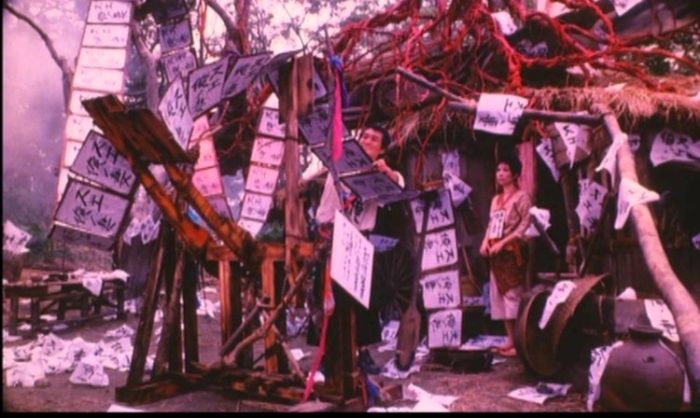“Come back in a hundred years’ time. After a hundred years you’ll understand.” Shuji Terayama
百年たったら帰っておいで
百年たてばその意味分かる。
Shuji Terayama’s final film, Saraba Hakobune, or Farewell to the Ark, was released in 1984, shortly after his death from illness at the age of 47.
Amongst all his films it had the largest budget and the highest production values. In the cast are well-known actors such as Yoshio Harada and Tsutomu Yamazaki, later to star in Juzo Itami’s Tanpopo and Yojiro Takita’s Oscar-winning Departures.
Although replete with Terayama’s usual hallucinatory imagery and surreal characters, the film is less autobiographical that his 1970s work and is set on a fictional Okinawan island, rather than his northern home territory of Aomori.
There is even a plot of sorts, revolving around a quarrel amongst different branches of the family that owns the only clock in the isolated village, all the others having been stolen and destroyed.
The story is based – very loosely indeed – on Gabriel Garcia Marquez’s One Hundred Years of Solitude. In a suitably Terayama-esque twist that book has lent its name to a fine, cask-aged shochu, which is apparently much appreciated by Japan’s Crown Prince.
Through the film’s dark comedy runs a meditation on time, memory & death, perhaps inspired by Terayama’s awareness of his own imminent demise
** Just outside the village a bottomless hole in the ground appears and rapidly expands. It seems to connect to a reality beyond time and space.
** Our hero murders his rival after being insulted at a cock-fighting match. He then makes friends with his ghost.
** A doomed couple heap their possessions onto a cart and flee in the middle of the night. After hours of travel they come to a deserted house and sleep until morning. When they open their eyes, they are back in their home.
** Our hero grows older while his wife stays young and beautiful. He becomes so forgetful he needs to stick labels on objects to remember what they are called.
** When the clock-controlling family dies out without issue, time comes to a stop in the village. In dribs and drabs the inhabitants leave for the prosperous, modernizing town, leaving the village deserted.
** One hundred years later the villagers, now leading humdrum urban existences, re-assemble for a final commemorative photo. They seem content, but the magic has gone.
Terayama was born eighty years ago and died thirty two years ago. He’s still there in that village. Everyone else has left for the town.

